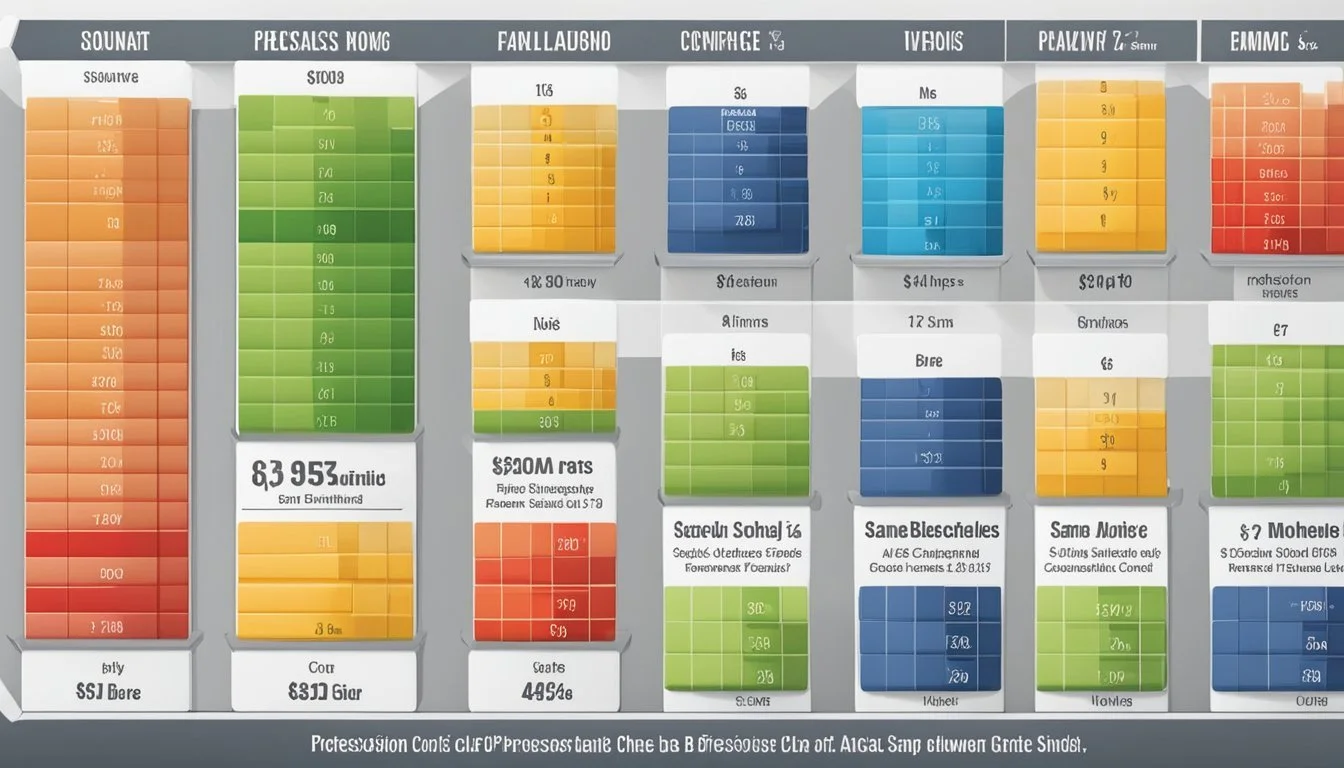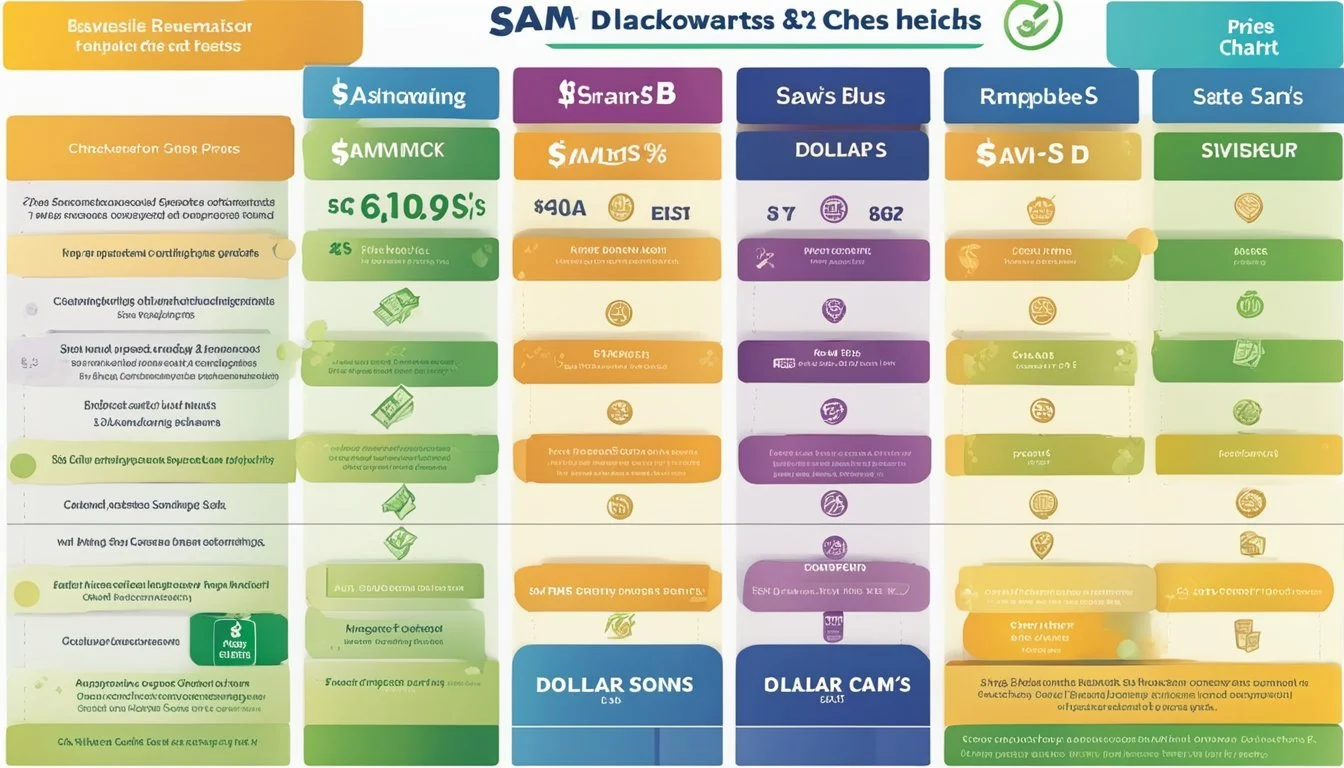Is Sam's Club Cheaper Than BJ's?
Comparing Membership Warehouse Prices
Part of Our Grocery Store Guide with Details on Sam's Club Prices and BJ's Wholesale Club Prices
When consumers are looking to stretch their dollar further in a competitive retail landscape, warehouse clubs like Sam's Club and BJ's Wholesale Club offer an appealing solution. Both membership-based retailers promise significant savings on a wide range of products sold in bulk, from groceries to electronics. Shoppers often debate which club offers the better deal, and one might assume that lower membership costs could indicate overall savings. However, the reality of which is cheaper depends on several factors, including product selection, brand availability, and membership perks.
Sam's Club, with its substantial number of locations, presents customers with extensive shopping convenience. With over 600 stores, it's widely accessible to consumers compared to BJ's, which operates just over 200 stores. This broad network could translate to better deals through economies of scale, potentially reducing prices for Sam's Club members. BJ's, on the other hand, while smaller in store count, is known for selling more name brands, which for some shoppers could justify any marginal cost difference.
The considerations for determining which wholesale club offers the better value go beyond just the sticker price. Membership tiers, annual dues, and exclusive member benefits play a crucial role in the overall value proposition. Both warehouse clubs offer similar perks, though differences in membership pricing may influence a consumer's decision. For instance, BJ's is noted to have slightly cheaper annual dues when compared to its peers, affecting the long-term savings potential for members. Ultimately, the question of whether Sam’s Club is cheaper than BJ’s cannot be answered with a simple yes or no; it requires a nuanced understanding of each retailer's offerings as well as the individual needs and shopping habits of the member.
Comparing Membership Models
When choosing a wholesale club membership, consumers weigh factors such as cost and benefits. Sam's Club and BJ's Wholesale Club offer different models that cater to various shopping needs.
Annual Membership Fees
Sam's Club offers a basic club membership at $45 annually. BJ's lowest priced membership, the Inner Circle, stands at $55 per year. Both clubs offer higher-tier memberships, usually providing additional benefits.
Membership Tiers
Sam's Club has two main tiers: the standard Club Membership and the premium Plus Membership. BJ's offers a similar structure with its Inner Circle and Perks Rewards memberships.
Gold Star vs Business Membership
At Costco, another competitor in the wholesale landscape, there is the Gold Star Membership for consumers and the separate Gold Star Business Membership for business owners. Sam's Club and BJ's memberships serve both individuals and businesses under their standard memberships without a specific designation.
Club+ vs Plus Membership
BJ's refers to their premium membership as Perks Rewards, costing $110 annually, which is comparable to Sam's Club's Plus Membership, priced at $100 per year. These higher-tier memberships offer greater rewards and benefits than their basic counterparts.
Assessing Product Ranges and Brands
When comparing Sam's Club and BJ's, it's essential to consider the variety and exclusivity of their in-house brands and the diversity of product categories they offer. Each retailer provides a range of products that reflects their unique branding strategies and customer value propositions.
Differentiating House Brands
Sam's Club boasts its exclusive Member's Mark brand, which offers customers a variety of products from bulk groceries to furniture. The brand is known for its competitive pricing, especially in bulk items such as rice, and spans across numerous categories including electronics, appliances, and clothing. In contrast, BJ's promotes its Wellsley Farms and Berkley Jensen brands, catering to consumers with its own array of products ranging from fresh produce to jewelry. While Wellsley Farms specializes in grocery items, Berkley Jensen covers a broader range including TVs and furniture. Both retailers aim to provide quality alternatives to name brands at a lower cost.
Diversity in Product Categories
Sam's Club and BJ's both offer an extensive selection of product categories, yet their inventories can vary. For instance, Sam's Club often includes a more diverse electronics section, featuring the latest TVs and other high-tech gadgets. This aligns with the retailer's strategy to attract a tech-savvy demographic seeking the newest electronic innovations. BJ's, on the other hand, places a strong emphasis on grocery items, offering a wide assortment of both fresh and packaged products. Their produce section is frequently updated with seasonal items, highlighting the brand's commitment to variety in the food department. Moreover, both stores carry popular name brands, ensuring that consumers have access to familiar products alongside the exclusive house brand options like Kirkland Signature at Sam's Club and Wellsley Farms and Berkley Jensen at BJ's.
Price Analysis
When comparing Sam's Club and BJ's, it's essential to consider how bulk purchasing costs, the impact of inflation, and the role of discounts and coupons affect the overall price benefits for consumers.
Bulk Purchasing Cost Comparison
In reviewing the bulk purchase offerings, one consistently finds that both Sam's Club and BJ's provide significant savings on staple items when bought in larger quantities. For example, BJ's price for a two-pack of 20 ounce loaves of white bread at $2.49, which equals $0.06 per ounce, is indicative of the type of savings offered. Consumers often find such competitive pricing across a variety of bulk items at both retailers.
Sam's Club:
1,000 baby wipes for $17.86
BJ's:
White bread 2-pack for $2.49
Dealing with Inflation
Inflation is a crucial factor influencing the cost of goods. Both Sam's Club and BJ's adjust their pricing strategies to manage inflationary pressures, ensuring that customers continue to receive value. Sam's Club, boasting over 600 locations, has the scale that can potentially offer some cushion against inflation. However, BJ's with fewer stores, focuses on offering more name brands, which may resonate with brand-conscious consumers even in times of rising prices.
Spotting Discounts and Coupons
Both clubs have strategies to offer additional savings through discounts and coupons. Sam's Club and BJ's accept manufacturer's coupons, providing another avenue for savings on top of their already discounted prices. However, it's important for shoppers to remain aware of each retailer's coupon policies as they might vary. Sales events and members-only discounts further augment the possibility of savings at these warehouse clubs.
Sam's Club:
Accepts manufacturer's coupons
BJ's:
Accepts manufacturer's coupons
More name-brand items that could offer additional savings with brand-specific discounts
By understanding the specifics of bulk purchasing, impacts of inflation, and the utilization of discounts and coupons, customers can determine which club might offer the best value for their shopping needs.
Checking Store Accessibility
When choosing between Sam's Club and BJ's Wholesale, consumers should consider the number of locations and their convenience, as well as the facilities each warehouse store provides. The accessibility of these stores can significantly impact the shopping experience.
Locations and Convenience
Sam's Club, owned by Walmart Inc., boasts over 600 locations across the United States, providing a sizable network for shoppers. BJ's Wholesale, on the other hand, operates just over 200 locations, with a significant presence on the East Coast. This difference in presence means that Sam's Club likely offers more convenience for a larger number of consumers looking for a warehouse club.
Sam's Club: More than 600 locations
BJ's Wholesale: Just over 200 locations, concentrated on the East Coast
Shoppers looking for variety may find BJ's Wholesale to their advantage, despite its smaller number of stores. It often carries a wider assortment of brands compared to Sam's Club. Here, the choice hinges on the balance between physical store accessibility and product diversity.
Warehouse Store Facilities
Warehouse clubs like Sam's Club and BJ's are designed to offer both resale and personal purchase options for items ranging from grocery staples to household goods. Both chains facilitate bulk purchases, with facilities geared toward accommodating large transaction volumes.
Bulk Purchase Facilities: Both offer ample space and infrastructure for large volume shopping.
BJ's Wholesale and Sam's Club warehouse facilities generally tend to be spacious and offer similar amenities. Sam's Club locations, which are part of the Walmart family, frequently share parking lots or are in close proximity to Walmart stores, which may extend convenience due to the association with Walmart's range of products and services. In terms of operating hours, warehouse clubs may open later than traditional grocery stores but tend to offer extended shopping hours for their members.
Bold claims about who offers the best facilities would be baseless without in-depth, location-specific analysis; however, it's clear that both warehouse clubs have developed their facilities to accommodate the needs of their customers effectively.
Rewards and Additional Benefits
When comparing Sam's Club and BJ's Wholesale Club, the rewards programs and additional benefits offer key value propositions with savings on purchases, perks associated with membership, and a variety of services ranging from optical centers to deli options.
Membership Rewards Programs
Sam's Club adopts a straightforward rewards approach with its memberships. Basic Club membership does not include cash back rewards, but the Plus membership, priced higher, provides the opportunity for members to earn cash back. Specifically, Plus members can earn $10 for every $500 spent, with a cap on annual cash back earnings at $500.
BJ's Wholesale Club also presents a tiered membership structure. The rewards here are quite competitive, as members can4 take advantage of cash back on purchases. Unlike Sam's Club, BJ's allows the use of manufacturer's coupons, which can be stacked with in-store offers, enhancing the potential for savings even further.
Additional Services and Amenities
In terms of services and amenities, both clubs provide a range of options, yet they do have their distinctions:
Sam's Club gives access to various services including a pharmacy, optical center, and even a health clinic in some locations. Plus members also benefit from extended early shopping hours, adding convenience to their shopping experience.
BJ's counters this with a more expansive product selection on its shelves, including a larger array of organic items. Additionally, BJ's is known for accepting manufacturer's coupons, which can augment savings on top of their own discounts and can be an attractive feature for savvy shoppers.
Both clubs offer food courts, gift card deals, and a variety of customer service options. Members of both Sam's Club and BJ's can expect a dedicated customer service for returns and inquiries, ensuring a quality shopping experience. However, BJ's return policy is known to be more restrictive when compared to Sam's Club.
Customer Experience Enhancements
In a competitive retail landscape, both Sam's Club and BJ's Wholesale Club strive to enhance the shopping experience with a focus on convenience and customer service.
Shopping & Checkout Conveniences
Sam's Club and BJ's have integrated various technological advancements into their shopping process to streamline the customer experience. Notable among these is the Scan & Go feature available on Sam's Club's app, which allows members to scan items as they shop and skip the traditional checkout line, offering a swift and seamless exit. BJ's services include the option for curbside pickup, providing a convenient alternative for those who prefer not to shop in-store. BJ's has also tested adding Dunkin' Donuts kiosks in some locations, aiming to create a more enjoyable shopping environment.
Sam's Club App Features:
Scan & Go
e-commerce integration
Digital membership card
BJ's Curbside Pickup:
Available for all members
Convenient pick-up slots
Return Policies Explained
The return policies of Sam's Club and BJ's are designed to ensure customer satisfaction and convenience. Sam's Club promotes a "100% satisfaction guarantee" on merchandise, implying that returns can be made without hassle when customers are dissatisfied. They offer free shipping for Plus members on most items, which complements their generous return policy. BJ's has a specific return policy that generally allows returns with a receipt and prohibits certain items from being returned, holding to industry standards. Both entities emphasize their dedication to convenience in returns.
Sam's Club Return Policy:
Free shipping for returns by Plus members
Nearly all items can be returned
BJ's Return Policy:
Many items are returnable with receipt
Some exclusions apply, such as special order items
Both retailers also utilize self-checkout stations to reduce wait times and further contribute to an efficient shopping experience.
Assessing Food and Beverage Offerings
When evaluating the food and beverage offerings at Sam's Club and BJ's, one must consider the variety, cost-effectiveness, and convenience of their snack bars and bulk food advantages.
Snack Bars and Food Courts
Sam's Club is renowned for its affordable and satisfying food court items. Customers often rave about the pizza and hot dogs, which are not only cheap but are also large in portion size. The club's food courts provide a quick and inexpensive solution for shoppers looking to grab a bite.
In contrast, BJ's offers a unique partnership with Dunkin' Donuts within certain locations, providing shoppers with a familiar and beloved coffee experience. While this extends their range of offerings, it may not necessarily compete with the value propositions of Sam's Club's self-branded snack selections.
Bulk Food Advantages
Product Sam's Club Advantage BJ's Advantage Chicken Often sold in larger quantities at lower per-unit prices. Sometimes offers more diverse poultry options. Snacks Extensive selection of their private label, Member's Mark. Wide assortment, includes many name-brand snacks as well. Dairy Competitive pricing on bulk items like butter and eggs. May offer a wider array of organic options. Vegetables Large, bulk packaging can lead to significant savings. Typically offers fresh produce in both bulk and smaller packages.
Both clubs provide opportunities to purchase bulk goods, which can be particularly cost-effective for large families or businesses. Sam's Club often boasts lower prices on bulk items due to its affiliation with Walmart, which wields immense buying power. Conversely, BJ's tends to have a wider variety of available products, potentially giving customers more choice in their selections.
The decision between Sam's Club and BJ's will depend on one's preferences for food court items, brand selection, and the balance between cost and product variety.







